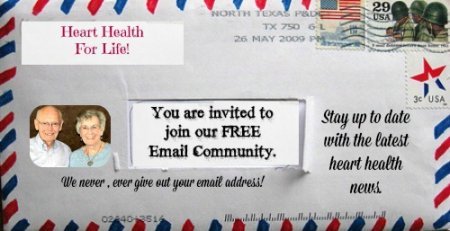Heart Disease and Stress Can
Cause a Heart Attack!
Five tips to reduce heart disease and stress.
Heart disease and stress were the furtherest thing from my mind. It was November 1990 and I was laying in a hospital bed at Doctor's Hospital in Modesto, California. I had received a near failing grade from the cardiologist for my less than stellar performance on the treadmill.
My heart went into ventricular tachycardia, which was a precursor to a heart attack.
The heart doctor's instruction to my wife was right to the point. "He needs to go to the hospital immediately... he is a walking time bomb."
How could this happen? I didn't appear to be a prime candidate for bypass surgery. My cholesterol and blood pressure were just a little high but the other heart risk factors appeared to be normal.
During a conversation with Dr. Hugh Tobin, the heart surgeon, my wife Bernie asked the doctor if there was a connection between heart disease and stress. "How much of this heart problem could be related to stress?"Dr. Tobin quickly replied,"Not over 95%.
At the time I was president of a community bank in Merced, Ca. The economy was terrible, the bank examiners report indicated that we had some "problem loans"and the bank directors (who were my bosses) were not happy about the situation.
I guess you could say the situation was stressful. At least my heart thought so.
Stress is a normal part of life. Life can be difficult and stress is unavoidable. But there are a lot of things we can do to keep it at bay,( none of which I was practicing.)
Whether or not your heart may be affected by stress appears to be related to the kind of stress you're experiencing, and, more importantly how you react to it. Although the researchers say there is no proof that stress causes heart disease you couldn't convince my wife of this.
Noted cardiologist Dr. Stephen Sinatra and Jonny Bowden, Phd. give an explanation of how heart disease and stress affect our body in their latest bestselling book, The Great Cholesterol Myth.
"Imagine you are a zebra grazing on the plains in the Africa. Everything is peaceful, the grass is delicious and all is well with the world.
"Suddenly you hear a rustling in the woods. You look up and see behind a bush the outline of a lion. a lion that is looking straight at you. You can almost see the thought bubble over its head:"lunch"
"Your body switches into full alert, the equivalent of flipping to red in the Department of Homeland Security's threat advisory system.
"The moment you see the lion, your hypothalamus, a section of the brain that acts as a first responder in emergency situations, sends a hormonal signal to your pituitary gland. Instantly, the pituitary relays the message to the adrenal glands, two little walnut-shaped glands that sit on top of the kidneys."
Their job is to pump out hormones whose actions are your only hope of living long enough to eat lunch tomorrow rather than becoming lunch today.
These hormones, cortisol and adrenaline, specifically are known as the stress hormones, and whether you're a zebra running for a lion or a caveman running from a wooly mammoth, you have them to thank for your survival.
Heart Disease and Stress Increase Blood Pressure
During stressful times, the heart rate increases and your blood pressure rises. Your body does this to send more oxygen to your body to ward off the perceived danger.
Heart Disease and Stress Improved With The Relaxation Response
When you take time out from the chaos in your day, you give yourself relief from the effects of stress. And stress is the enemy of healthy blood pressure.
Dr. Herbert Benson, the cardiologist who developed the Relaxation Response method, and authored a book by the same name, conducted clinical studies that determined how to lower physiological signs of stress, such as heart rate, blood pressure and rate of oxygen consumption.
Take 20 minutes, one or two times a day and follow these simple steps to lower blood pressure instantly:
- Find a secluded spot where you won't be disturbed.
- Get comfortable (either lying down or sitting up).
- Focus on something pleasant, such as a peaceful place or a favorite piece of music. Close your eyes
- Breathe deeply from your diaphragm. Breathe in slowly through your nose while counting to four. Exhale slowly through your mouth, completing the count 5,6,7 and 8 while focusing on relaxing your muscles.
- Repeat this several times and you will feel the tension slip out of your body.
- Let your thoughts wander, but come quickly back to your pleasant focal point if stressful thoughts intrude.
A Positive Attitude Can Lower Risks of Heart Disease and Stress
In a John Hopkins Health Alert, Stress and Heart Disease the researchers concluded that people with cheerful temperaments are significantly less likely to suffer a coronary event such as a heart attack or sudden cardiac death.
Cardiology specialists are in general agreement that a positive outlook on life can reduce stress and the risks of a heart attack or stroke.
There is plenty of evidence to support a link between psychological stress and the health of your heart. Our stress, and how we react to it, has an immediate and potentially negative effect on our blood vessels.
Even the normal stress that we experience in everyday life (and there is plenty of it) can cause a temporary restriction in the arteries of our heart.
Chronic stress can also cause increased c-reactive protein (CRP), which is a measure of inflammation in the body.
Inflammation of the heart is one of the primary causes of clogging of the arteries. Cholesterol levels also tend to increase during periods of increased stress.
So chronic stress can potentially accelerate atherosclerosis both by directly affecting your blood vessels, and by contributing to a worsening of your overall cardiac risk profile.
Extremely stressful life events related to heart disease and stress. Situations such as the death of a loved one, divorce, loss of a job, business failure, exposure to natural (or man-made) disasters, or serious family conflicts are associated with a significantly increased risk of having a heart attack for up to a year after the stressful event.
Heart Disease and Stress Reduced by Exercise
During the really difficult times a brisk walk (with some huffing and puffing spurts) made the troubles seem less daunting.
Some persons avoid exercise because they are afraid of having a heart attack. The opposite is true, but there is a right and a wrong way to execise safely. I recommend that you look at the best exercise fitness program that we have found.
Faith, family and friends can play a big role
in coping with stress.
We are social people and having a loving community to lean on during stressful times is very important. It has been proven that prayer can be a powerful remedy to relax our mind in stressful situations.
A verse from the bible that has helped me keep my mind on the important things in life is:
"Fix your thoughts on what is true and good and right. Think about all you can praise God for and be glad about." Philippians 4:8-9 The Living Bible.

We never, ever give out your email address to anyone...period. It is safe with us.
Related Articles to Heart Disease and Stress
Home Page
|
